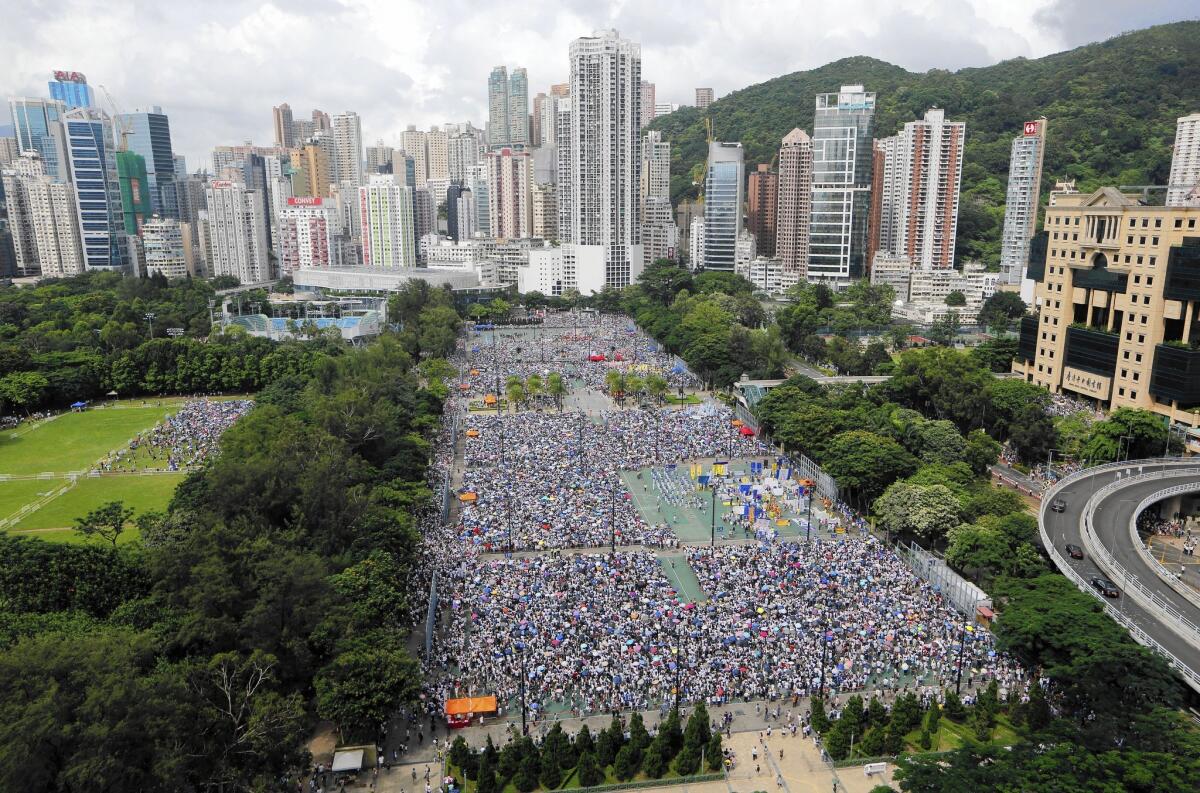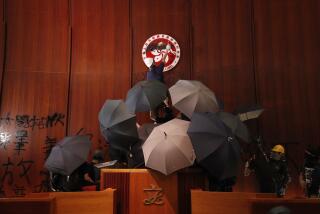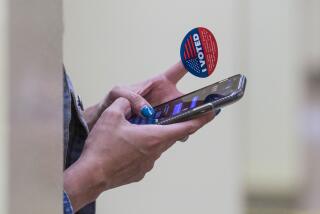Politics reaching a boiling point in Hong Kong

The giant alien robot smackdown in “Transformers: Age of Extinction” isn’t the only fight raging in Hong Kong this summer. The southern Chinese territory has been consumed by a real-life political battle royale.
Massive crowds have taken to the streets to demonstrate. Cops arrested more than 500 people at a sit-in and pepper sprayed others trying to smash through the doors of the legislature. Inside the chamber, one lawmaker even hurled a glass toward Hong Kong’s chief executive, the city’s (widely disliked) top leader.
High schoolers interrupt their graduation ceremonies with tuneful protests of “Do You Hear the People Sing?” from “Les Miserables.”
Bosses of big banks and accounting firms face off against their own employees, taking out dueling political ads in newspapers.
“Politics in Hong Kong has become far more intense than ever before,” says Sonny Lo, co-director of the Center for Governance and Citizenship at the Hong Kong Institute of Education. “And there’s more political troubles ahead this year, definitely.”
The issues are myriad: people mad about sky-high housing prices, a growing rich-poor gap, controversial development plans and an influx of mainland visitors. Many of the smaller battles have been subsumed into a larger drama concerning how Hong Kongers pick their leaders, and how responsive those leaders are to citizens’ needs.
The territory is now tussling over a fundamental question: What will the rules be for elections in 2017?
For the first time, Communist authorities in Beijing have promised to allow voters in the semiautonomous region to directly cast ballots for chief executive, but they insist that all candidates must “love the country and love Hong Kong” and be approved by a 1,200-member committee composed largely of Hong Kong professionals. Democracy activists say that will allow Beijing to toss out whomever it doesn’t like.
Hong Kong, a British outpost for about 150 years, reverted to Chinese sovereignty in 1997 under a framework known as “one country, two systems.” The agreement said Hong Kong would retain its wide-ranging freedom, Western legal system and a high degree of latitude to manage is own affairs. But how to interpret and implement provisions of the framework — such as the election rules — has proved contentious.
Last month, nearly 800,000 Hong Kongers defied finger-wagging from Beijing to cast ballots in a citizen-organized referendum in support of the open-nominations model for the 2017 election. Now, organizers of a civil disobedience movement called Occupy Central with Peace and Love have threatened to take over the city’s financial district if they’re unsatisfied with the election plan the government puts forth.
Though Hong Kong has a well-trained police force of more than 33,000, opponents warn that even a peaceful “occupation” could harm the city’s economy, paralyze transportation and invite a harsh response from China’s central government. Banks such as HSBC, accounting firms such as Ernst & Young, and even the local Canadian, Indian and Italian chambers of commerce have spoken out about possible negative consequences.
The debate is fraying relationships among family members, work colleagues and longtime pals.
“It’s very politically charged nowadays. Friendships are at stake and people are refusing to listen to other viewpoints,” says Peter Chang, a Taiwan native who has lived in Hong Kong for 20 years. Chang works in the financial sector and describes himself as being “as liberal as they come” regarding freedom of expression, but nevertheless believes the civil disobedience campaign will backfire.
Gary Suen, a 38-year-old manager in the IT sector, is on the flip side.
“I consider myself politically conservative, but I think what the government will propose is going to be even more conservative … so I’m all for Occupy Central,” says Suen, a native Hong Konger.
Though middle-aged professionals like Suen and Chang seem to be fairly evenly divided, a clear generational split is at work. Young Hong Kongers — some not even out of high school — make up a key part of the faction pressing for what they call “real democracy.”
“I would like to decide my future by myself. I don’t want 1,200 people on an ‘election committee’ to decide the future of Hong Kong,” said high school student Joshua Wong, leader of a 300-member youth group called Scholarism active in the volunteer referendum, marches and sit-in.
At 17, Joshua is still a year away from Hong Kong’s legal voting age, but he has been a force in politics for a couple of years, galvanized by fighting the government’s efforts to introduce a “national education” curriculum aimed at boosting patriotism toward China.
Lo, the professor, says the rise of young activists is a key factor in the spread of democratic populism.
“The young people have a strong sense of their rights, and they’re strongly influenced by social media, the blogs and Internet, and these tend to be quite critical of mainland China,” Lo says. “Many of them are localists; they have a very strong Hong Kong identity.”
Zhou Xiaozheng, a sociologist at the People’s University in Beijing, says the role of teens and twentysomethings in Hong Kong politics is natural. “We have a saying in Chinese: Young cattle are not afraid of tigers,” Zhou quipped.
But the tigers in Beijing are not in a mood to be challenged, Zhou says. They’re facing a slowing economy and a pollution crisis, even as they’re engaged in a contentious battle to root out corruption.
“They are in fear; they are worried,” Zhou said of the mainland leaders. “Because of this, they might be tougher on Hong Kong than they would otherwise be.”
The increasing ties between Hong Kong’s teenage organizers like Joshua Wong and young activists in Macao and Taiwan may also be giving Beijing heartburn. Some Hong Kong activists have traveled to Taiwan to meet with protest leaders there, and Macanese youths have joined in Hong Kong’s marches and demonstrations.
The last thing mainland officials want is for Hong Kong activists adopting tactics from Taiwan, where students this spring stormed the national legislature to protest a trade pact with the mainland.
A protest and democracy movement seems to be budding in Macao as well, inspired in part by Hong Kong, an hour’s ferry ride away. Like Hong Kong, the former Portuguese territory enjoys semiautonomous status, but its politics have rarely been contentious.
Hong Kong officials will soon put forth their proposal for the 2017 election guidelines. Lo isn’t expecting any last-minute change, so he predicts Occupy Central is just “a matter of time.”
Joshua also says the fight will go on. Already, he and his fellow students are preparing their next act of civil disobedience. “We have already accepted that at some point we will be arrested,” he said. “But we believe more action and pressure will result in a better political system for Hong Kong.”
Nicole Liu in The Times’ Beijing bureau contributed to this report.
Follow me on Twitter: @JulieMakLAT
More to Read
Start your day right
Sign up for Essential California for news, features and recommendations from the L.A. Times and beyond in your inbox six days a week.
You may occasionally receive promotional content from the Los Angeles Times.







